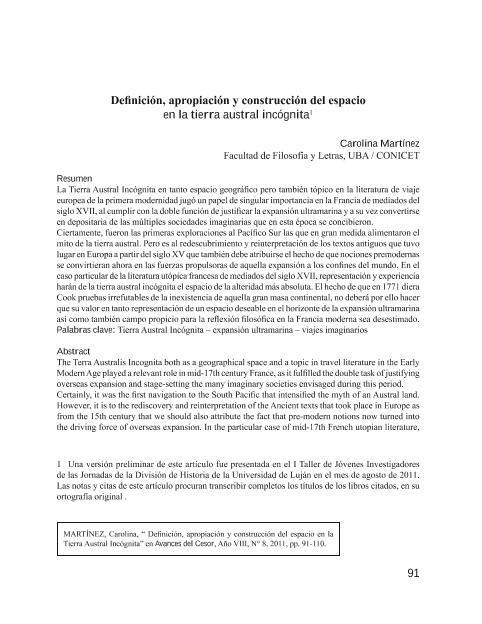Mostrar el registro sencillo del ítem
dc.contributor.author
Martinez, Carolina

dc.date.available
2023-04-17T10:59:25Z
dc.date.issued
2011-12
dc.identifier.citation
Martinez, Carolina; Definición, apropiación y construcción del espacio en la Tierra Austral Incógnita; Universidad Nacional de Rosario. Investigaciones Socio-Históricas Regionales; Avances del Cesor; 8; 12-2011; 91-110
dc.identifier.issn
1514-3899
dc.identifier.uri
http://hdl.handle.net/11336/194047
dc.description.abstract
La tierra austral incógnita en tanto espacio geográfico pero también tópico en la literatura de viaje europea de la primera modernidad jugó un papel de singular importancia en la Francia de mediados del siglo XVII, al cumplir con la doble función de justificar la expansión ultramarina y a su vez convertirse en depositaria de las múltiples sociedades imaginarias que en esta época se concibieron. Ciertamente, fueron las primeras exploraciones al Pacífico Sur las que en gran medida alimentaron el mito de la tierra austral. Pero es al redescubrimiento y reinterpretación de los textos antiguos que tuvo lugar en Europa a partir del siglo XV que también debe atribuirse el hecho de que nociones premodernas se convirtieran ahora en las fuerzas propulsoras de aquella expansión a los confines del mundo. En el caso particular de la literatura utópica francesa de mediados del siglo XVII, representación y experiencia harán de la tierra austral incógnita el espacio de la alteridad más absoluta. El hecho de que en 1771 diera Cook pruebas irrefutables de la inexistencia de aquella gran masa continental, no deberá por ello hacer que su valor en tanto representación de un espacio deseable en el horizonte de la expansión ultramarina así como también campo propicio para la reflexión filosófica en la Francia moderna sea desestimado.
dc.description.abstract
The Terra Australis Incognita both as a geographical space and a topic in travel literature in the Early Modern Age played a relevant role in mid-17th century France, as it fulfilled the double task of justifying overseas expansion and stage-setting the many imaginary societies envisaged during this period. Certainly, it was the first navigation to the South Pacific that intensified the myth of an Austral land. However, it is to the rediscovery and reinterpretation of the Ancient texts that took place in Europe as from the 15th century that we should also attribute the fact that pre-modern notions now turned into the driving force of overseas expansion. In the particular case of mid-17th French utopian literature, representation and experience will make the Austral land-unknown home of the most radical otherness. The fact that in 1771 Cook proved the inexistence of this large continental mass, should therefore not, by any means, make us dismiss the importance of the terra australis incognita as a motivating force behind France’s ambitions overseas nor its stimulating effects in Modern philosophical thought.
dc.format
application/pdf
dc.language.iso
spa
dc.publisher
Universidad Nacional de Rosario. Investigaciones Socio-Históricas Regionales
dc.rights
info:eu-repo/semantics/openAccess
dc.rights.uri
https://creativecommons.org/licenses/by/2.5/ar/
dc.subject
Tierra Austral Incógnita
dc.subject
expansión ultramarina
dc.subject
viajes imaginarios
dc.subject
literatura de viaje
dc.subject.classification
Historia

dc.subject.classification
Historia y Arqueología

dc.subject.classification
HUMANIDADES

dc.title
Definición, apropiación y construcción del espacio en la Tierra Austral Incógnita
dc.type
info:eu-repo/semantics/article
dc.type
info:ar-repo/semantics/artículo
dc.type
info:eu-repo/semantics/publishedVersion
dc.date.updated
2023-04-14T15:52:49Z
dc.journal.number
8
dc.journal.pagination
91-110
dc.journal.pais
Argentina

dc.journal.ciudad
Rosario
dc.description.fil
Fil: Martinez, Carolina. Consejo Nacional de Investigaciones Científicas y Técnicas; Argentina. Universidad de Buenos Aires. Facultad de Filosofía y Letras; Argentina
dc.journal.title
Avances del Cesor
dc.relation.alternativeid
info:eu-repo/semantics/altIdentifier/url/https://ojs.rosario-conicet.gov.ar/index.php/AvancesCesor/article/view/v8n8a05
Archivos asociados
